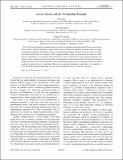Grover Search and the No-Signaling Principle
Author(s)
Bao, Ning; Jordan, Stephen P.; Bouland, Adam Michael
DownloadPhysRevLett.117.120501.pdf (164.2Kb)
PUBLISHER_POLICY
Publisher Policy
Article is made available in accordance with the publisher's policy and may be subject to US copyright law. Please refer to the publisher's site for terms of use.
Terms of use
Metadata
Show full item recordAbstract
Two of the key properties of quantum physics are the no-signaling principle and the Grover search lower bound. That is, despite admitting stronger-than-classical correlations, quantum mechanics does not imply superluminal signaling, and despite a form of exponential parallelism, quantum mechanics does not imply polynomial-time brute force solution of NP-complete problems. Here, we investigate the degree to which these two properties are connected. We examine four classes of deviations from quantum mechanics, for which we draw inspiration from the literature on the black hole information paradox. We show that in these models, the physical resources required to send a superluminal signal scale polynomially with the resources needed to speed up Grover’s algorithm. Hence the no-signaling principle is equivalent to the inability to solve NP-hard problems efficiently by brute force within the classes of theories analyzed.
Date issued
2016-09Department
Massachusetts Institute of Technology. Computer Science and Artificial Intelligence Laboratory; Massachusetts Institute of Technology. Department of Electrical Engineering and Computer ScienceJournal
Physical Review Letters
Publisher
American Physical Society
Citation
Bao, Ning, Adam Bouland, and Stephen P. Jordan. “Grover Search and the No-Signaling Principle.” Physical Review Letters 117.12 (2016): n. pag. © 2016 American Physical Society
Version: Final published version
ISSN
0031-9007
1079-7114